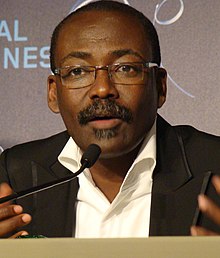Portal:African cinema/Selected biography/27

![]() Mahamat-Saleh Haroun, (born in 1961 in Abéché, Chad) is a Chadian film director. Though living in France since the 80s, he remains his country's best known and most awarded filmmaker, recognized for his films set and filmed in Chad. Earlier in his career his films tended to focus on the impact of the country’s multiple civil wars, but since the end of the last one in 2010, Haroun has increasingly turned his attention to other social concerns.
Mahamat-Saleh Haroun, (born in 1961 in Abéché, Chad) is a Chadian film director. Though living in France since the 80s, he remains his country's best known and most awarded filmmaker, recognized for his films set and filmed in Chad. Earlier in his career his films tended to focus on the impact of the country’s multiple civil wars, but since the end of the last one in 2010, Haroun has increasingly turned his attention to other social concerns.
After directing several shorts in the 90s, Haroun released his first feature film Bye Bye Africa (1999), which he wrote, directed, and starred in, and is Chad's first feature film. Other notable films followed, including:
Abouna (2002), follows two brothers on a quest to find their missing father, and was awarded the Best Cinematography award at FESPACO. Dry Season (2006) tells the story of a son who sets out to avenge his father’s murder during the civil war, and won the Yennenga Bronze Standard prize, as well as the Best Cinematography award at FESPACO. His fourth feature film A Screaming Man (2010), also framed around Chad’s conflict, won the Jury Prize at the 2010 Cannes Film Festival.
With GriGris (2013), Haroun trains his lens on a young dancer pulled into the world of smuggling. The film was nominated for the Palme d'Or at the Cannes Film Festival.
Haroun's most recent film Lingui, The Sacred Bonds (2021) a female-centered drama, deals with the fallout facing a mother and daughter when the 15-year old becomes pregnant in a country where abortion is both illegal and considered immoral.